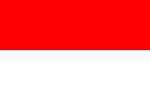Kesatuan Melayu Muda
|
Kesatuan Melayu Muda
Young Malays Union كساتوان ملايو مودا KMM |
|
|---|---|
 |
|
| Abbreviation | KMM |
| Leader | Ibrahim Yaacob (founder and leader) |
| Founded | 1938 |
| Dissolved | 1945 |
| Preceded by | Malay Youth League |
| Newspaper | Warta Malaya (Singapore) |
| Ideology |
Greater Indonesia Anti-imperialism Left-wing nationalism |
| Political position | Left-wing |
| Colours | Red, white |
Kesatuan Melayu Muda (KMM) (Jawi: كساتوان ملايو مودا ; roughly Young Malays Union in Malay) was the first national political establishment in British Malaya. Founded by Ibrahim Yaacob and Ishak Haji Mohammad, KMM grew into a prominent pre- war nationalist movement, notable for its leftist political stance and willingness to use violence, a sharp break with their contemporaries in the Malay nationalist movement.
The KMM, however, commanded very little mass support- by 1945, it only enjoyed a membership of 60. In addition, their radical anti- colonialism was anathema to British authorities, who ordered it summarily dissolved in 1945, and its leaders arrested.
Broadly speaking, the intellectual basis for what was to become developed both from external impetus from the spread of Indonesian nationalist ideas into Malaysia, and the development of an anti- colonialist intellectual climate within the Sultan Idris Training College for Malay Teachers. In 1927, Malay nationalism in British Malaya received intellectual impetus from their Indonesian cousins in the wake of the failed 1926 Communist uprising against the Dutch in the Dutch East Indies. Malay nationalist leaders, such as the Comintern agent Tan Malaka, sought refuge in Malaya in the wake of the crackdown that ensued, where they spread their radical anti- colonial ideology to Malaya.
This was a significant development in Malay nationalism, given that the nationalism that had developed in Malaya, in contrast to the movements developing in the other British colonial possessions of India and Burma, remained relatively placid and moderate. Groups such as the Kesatuan Melayu Singapura, while advocating self- strengthening within the Malayan community, for instance by purchasing land for Malay reservations in 1928, or by pooling funds to send Malays to Oxford and Cambridge in order to ensure the continued preeminence of Malays in the administration of British Malaya, did not challenge British rule, and opted to collaborate with the British. In contrast, the ideology of the Indonesian nationalists was fundamentally radical and anti- colonialist. Pamphlets from the Partai Nasional Indonesia were spread locally, advocating non- compliance with the British and resistance to colonial rule. This Indonesian radicalism would later come to form the intellectual nucleus of the KMM.
...
Wikipedia
